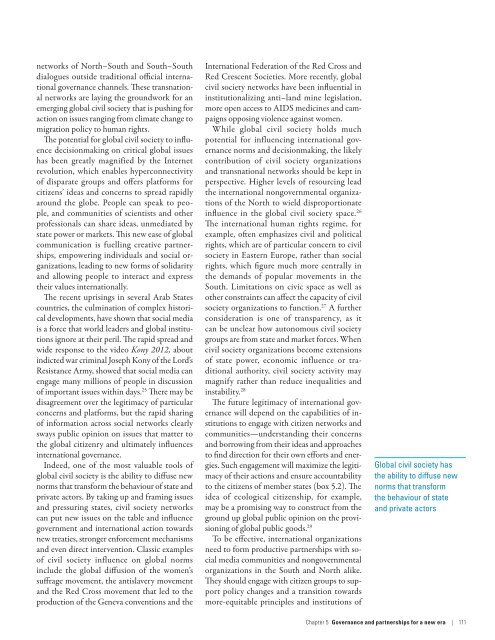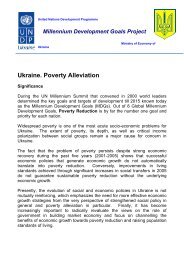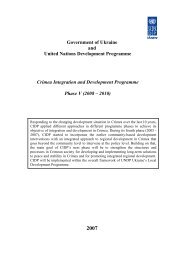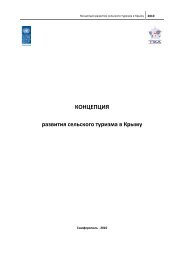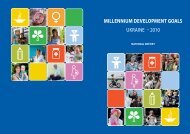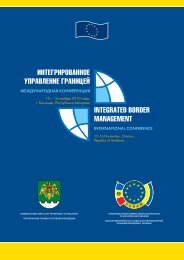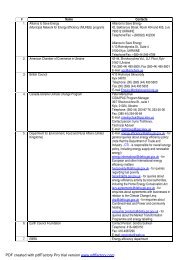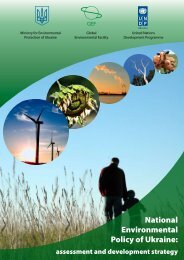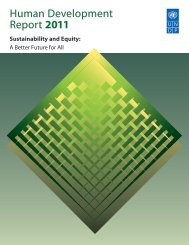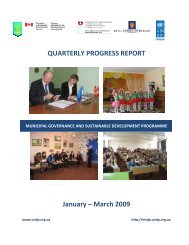E N S W - United Nations Development Programme
E N S W - United Nations Development Programme
E N S W - United Nations Development Programme
Create successful ePaper yourself
Turn your PDF publications into a flip-book with our unique Google optimized e-Paper software.
networks of North–South and South–South<br />
dialogues outside traditional official international<br />
governance channels. These transnational<br />
networks are laying the groundwork for an<br />
emerging global civil society that is pushing for<br />
action on issues ranging from climate change to<br />
migration policy to human rights.<br />
The potential for global civil society to influence<br />
decisionmaking on critical global issues<br />
has been greatly magnified by the Internet<br />
revolution, which enables hyperconnectivity<br />
of disparate groups and offers platforms for<br />
citizens’ ideas and concerns to spread rapidly<br />
around the globe. People can speak to people,<br />
and communities of scientists and other<br />
professionals can share ideas, unmediated by<br />
state power or markets. This new ease of global<br />
communication is fuelling creative partnerships,<br />
empowering individuals and social organizations,<br />
leading to new forms of solidarity<br />
and allowing people to interact and express<br />
their values internationally.<br />
The recent uprisings in several Arab States<br />
countries, the culmination of complex historical<br />
developments, have shown that social media<br />
is a force that world leaders and global institutions<br />
ignore at their peril. The rapid spread and<br />
wide response to the video Kony 2012, about<br />
indicted war criminal Joseph Kony of the Lord’s<br />
Resistance Army, showed that social media can<br />
engage many millions of people in discussion<br />
of important issues within days. 25 There may be<br />
disagreement over the legitimacy of particular<br />
concerns and platforms, but the rapid sharing<br />
of information across social networks clearly<br />
sways public opinion on issues that matter to<br />
the global citizenry and ultimately influences<br />
international governance.<br />
Indeed, one of the most valuable tools of<br />
global civil society is the ability to diffuse new<br />
norms that transform the behaviour of state and<br />
private actors. By taking up and framing issues<br />
and pressuring states, civil society networks<br />
can put new issues on the table and influence<br />
government and international action towards<br />
new treaties, stronger enforcement mechanisms<br />
and even direct intervention. Classic examples<br />
of civil society influence on global norms<br />
include the global diffusion of the women’s<br />
suffrage movement, the antislavery movement<br />
and the Red Cross movement that led to the<br />
production of the Geneva conventions and the<br />
International Federation of the Red Cross and<br />
Red Crescent Societies. More recently, global<br />
civil society networks have been influential in<br />
institutionalizing anti–land mine legislation,<br />
more open access to AIDS medicines and campaigns<br />
opposing violence against women.<br />
While global civil society holds much<br />
potential for influencing international governance<br />
norms and decisionmaking, the likely<br />
contribution of civil society organizations<br />
and transnational networks should be kept in<br />
perspective. Higher levels of resourcing lead<br />
the international nongovernmental organizations<br />
of the North to wield disproportionate<br />
influence in the global civil society space. 26<br />
The international human rights regime, for<br />
example, often emphasizes civil and political<br />
rights, which are of particular concern to civil<br />
society in Eastern Europe, rather than social<br />
rights, which figure much more centrally in<br />
the demands of popular movements in the<br />
South. Limitations on civic space as well as<br />
other constraints can affect the capacity of civil<br />
society organizations to function. 27 A further<br />
consideration is one of transparency, as it<br />
can be unclear how autonomous civil society<br />
groups are from state and market forces. When<br />
civil society organizations become extensions<br />
of state power, economic influence or traditional<br />
authority, civil society activity may<br />
magnify rather than reduce inequalities and<br />
instability. 28<br />
The future legitimacy of international governance<br />
will depend on the capabilities of institutions<br />
to engage with citizen networks and<br />
communities—understanding their concerns<br />
and borrowing from their ideas and approaches<br />
to find direction for their own efforts and energies.<br />
Such engagement will maximize the legitimacy<br />
of their actions and ensure accountability<br />
to the citizens of member states (box 5.2). The<br />
idea of ecological citizenship, for example,<br />
may be a promising way to construct from the<br />
ground up global public opinion on the provisioning<br />
of global public goods. 29<br />
To be effective, international organizations<br />
need to form productive partnerships with social<br />
media communities and nongovernmental<br />
organizations in the South and North alike.<br />
They should engage with citizen groups to support<br />
policy changes and a transition towards<br />
more-equitable principles and institutions of<br />
global civil society has<br />
the ability to diffuse new<br />
norms that transform<br />
the behaviour of state<br />
and private actors<br />
Chapter 5 Governance and partnerships for a new era | 111


